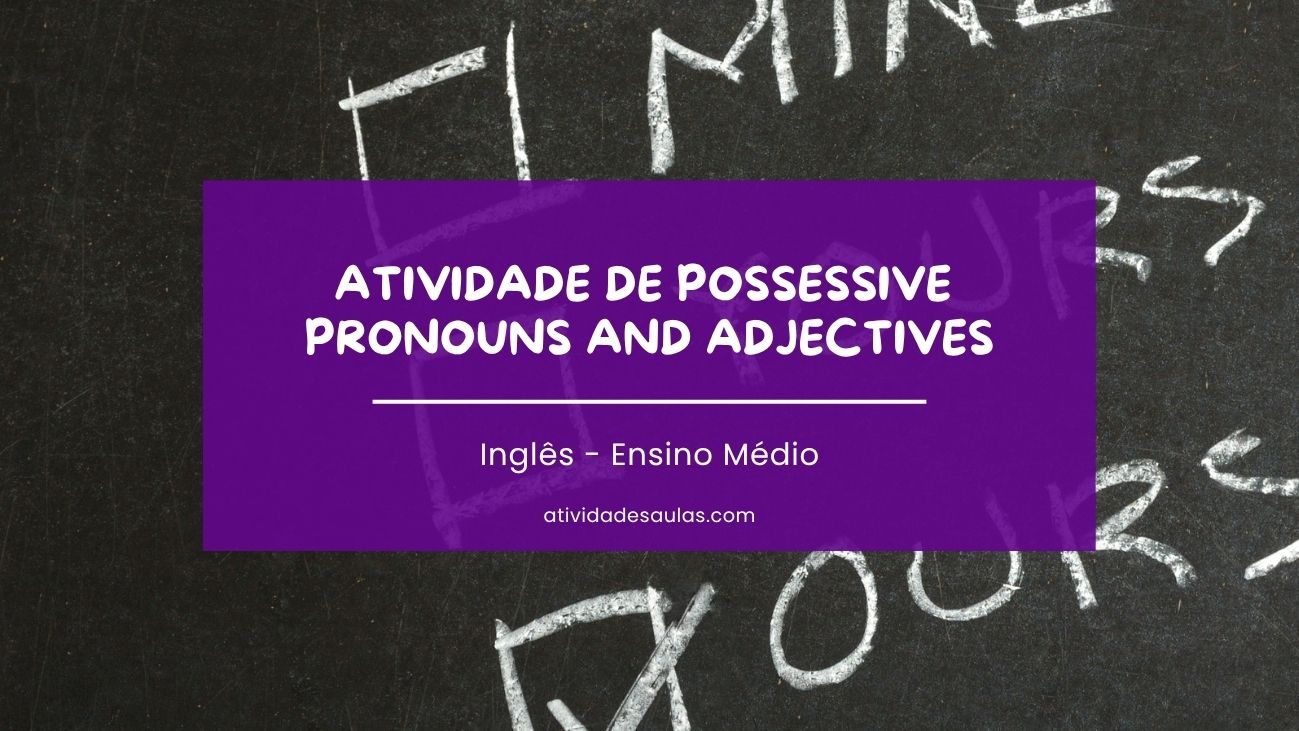Confira a atividade de possessive pronouns and adjectives, elaborada para o Ensino Médio, com gabarito e alinhada à BNCC.
Esta atividade foi pensada para aprofundar a compreensão dos estudantes sobre os pronomes e adjetivos possessivos em inglês, estimulando a aplicação gramatical e a interpretação crítica e contextual. As primeiras questões abordam o conteúdo de forma geral, para revisar e consolidar o uso correto dessas estruturas linguísticas em frases e pequenos textos.
Na sequência, a atividade explora a música "deja vu", de Olivia Rodrigo, um sucesso contemporâneo muito próximo do universo juvenil, que permite relacionar gramática e leitura crítica de texto artístico. Ao analisar a letra, os estudantes são convidados a refletir sobre os sentimentos transmitidos, as relações interpessoais e a forma como os possessives contribuem para o tom emocional da canção.
Dessa forma, a proposta promove o desenvolvimento de competências linguísticas, interpretativas e criativas, aproximando a aprendizagem do cotidiano e dos interesses dos alunos, além de favorecer a prática comunicativa em diferentes gêneros e suportes.
Clique aqui para mais atividades de Inglês
1) Leia a frase e identifique se "his" está sendo usado como pronome possessivo ou adjetivo possessivo. Explique sua escolha.
"John forgot his backpack at school, but his was found by the janitor."
2) Choose the correct option to complete the sentence:
"This is not my book; it is ____."
a) mine
b) my
c) me
d) I
3) Reescreva a frase abaixo substituindo "Mary and Tom" por um possessive adjective apropriado:
"Mary and Tom lost Mary and Tom’s tickets yesterday."
4) Analyze the short text and answer in English:
"When Maria moved to New York, her friends missed her a lot. However, Maria never forgot them and always sent gifts from her new city."
How do possessive adjectives contribute to the meaning and emotional tone of the text?
5) Select the sentence where the possessive pronoun is used correctly:
a) This pen are ours.
b) That house is ours.
c) Those shoes are my.
d) This bag is they.
6) Choose the alternative that best completes the sentence:
"Peter and Sarah invited us to ____ wedding, but we couldn't find ____ invitation in our mail."
a) their / our
b) theirs / our
c) their / ours
d) theirs / ours
7) Mark the sentence where "its" is used correctly:
a) The cat cleaned it’s fur for hours.
b) The company changed its logo last year.
c) I think its a great idea.
d) The dog wagged it’s tail happily.
Leia abaixo a letra da música deja vu, de Olivia Rodrigo, para responder às questões 8 a 10:
Car rides to Malibu
Strawberry ice cream, one spoon for two
And tradin' jackets
Laughin’ 'bout how small it looks on you
(Ha, ha, ha, ha, ha, ha, ha, ha, ha, ha, ha, ha)
Watching reruns of Glee
Bein' annoying, singin’ in harmony
I bet she's braggin' to all her friends
Sayin' you're so unique, hmm
So when you gonna tell her
That we did that, too?
She thinks it's special, but it's all reused
That was our place, I found it first
I made the jokes you tell to her
When she's with you
Do you get déjà vu when she’s with you?
Do you get déjà vu? Hmm
Do you get déjà vu, huh?
Do you call her, almost say my name?
'Cause let's be honest, we kinda do sound the same
Another actress
I hate to think that I was just your type
And I bet that she knows Billy Joel
'Cause you played her Uptown Girl
You're singin' it together
Now I bet you even tell her how you love her
In between the chorus and the verse (oh, I love you)
So when you gonna tell her
That we did that, too?
She thinks it's special, but it’s all reused
That was the show we talked about
Played you the songs she's singing now
When she's with you
Do you get déjà vu when she's with you?
Do you get déjà vu? (oh)
Do you get déjà vu?
Strawberry ice cream in Malibu
Don't act like we didn't do that, too
You're tradin' jackets like we used to do
(Yeah, everything is all reused)
Play her piano, but she doesn't know (oh, oh)
That I was the one who taught you Billy Joel (oh)
A different girl now, but there's nothing new
I know you get déjà vu
I know you get déjà vu
I know you get déjà vu
RODRIGO, Olivia.Déjà Vu. Disponível em:https://www.letras.mus.br/olivia-rodrigo/deja-vu/. Acesso em: 15 jul. 2025.
8) De acordo com a letra da música, responda:
a) Qual é a principal mensagem que a narradora quer transmitir ao ex-parceiro ao longo da música?
b) Em vários momentos, a narradora descreve memórias compartilhadas que agora são "reutilizadas" com a nova parceira. O que isso revela sobre os sentimentos dela e sua visão do relacionamento?
9) Com base nos possessive adjectives e pronouns usados na música, responda:
a) Cite três exemplos de possessive adjectives ou pronouns usados na letra completa e explique a função de cada um no contexto da música.
b) A palavra "your" aparece várias vezes na música. O que o uso repetido desse possessive adjective sugere sobre o foco emocional da narradora?
10) Assinale a alternativa correta quanto ao uso dos possessives na letra completa:
a) Em “my name”, "my" funciona como possessive pronoun.
b) Em “your type”, "your" é um possessive adjective.
c) Em “her friends”, "her" é um possessive pronoun.
d) Em “she’s with you”, "she" é um possessive adjective.
| Habilidades trabalhadas na atividade de possessive pronouns and adjectives | Descrição |
|---|---|
| EM13LGG301LI16PE | Produzir textos em diferentes modalidades, gêneros e suportes, considerando a temática abordada e os efeitos de sentido promovido pelos recursos lexicais, audiovisuais e multissemióticos utilizados (fontes, negrito, grifos, itálico, cores, imagens, volume dos sons, entre outros), levando em conta suas formas e seus funcionamentos, para produzir sentidos em diferentes contextos. |
| EM13LGG105LI10PE | (Re)criar textos escritos em língua inglesa, de caráter multissemiótico (programa de rádio, canal na Internet, jornal impresso ou digital) como proposta de intervenção social acerca de algum tema da realidade estudantil. |
| EM13LGG301LI17PE | Produzir, individual e/ou coletivamente, textos orais e/ou escritos que empreguem recursos persuasivos (comerciais para rádio e TV, anúncios publicitários, etc.), verbais e não verbais, de modo criativo, respeitando as especificidades da língua inglesa (formas verbais, entonação etc.), bem como as características próprias de cada gênero escolhido, considerando estruturas linguísticas mais familiares. |
Gabarito da atividade de possessive pronouns and adjectives
Atividade 1: "his backpack" = possessive adjective; "his (was found)" = possessive pronoun.
Atividade 2: Alternativa a.
Atividade 3: They lost their tickets yesterday.
Atividade 4: Possessive adjectives show emotional connection and belonging, making the text more personal and affectionate.
Atividade 5: Alternativa b.
Atividade 6: Alternativa a.
Atividade 7: Alternativa b.
Atividade 8a: She wants to show that the new relationship is not original and that he is just repeating what they had.
Atividade 8b: It reveals her frustration and sense of betrayal; she feels replaced, as if her special moments have been copied and lost their uniqueness.
Atividade 9a: Examples: "my name" (shows her identity), "your type" (emphasizes his preferences), "her friends" (indicates the new girl's circle).
Atividade 9b: It keeps the emotional focus on him, emphasizing his actions and decisions, and underlines her fixation on how he treats the new relationship similarly.
Atividade 10: Alternativa b.
Este conteúdo te ajudou? Considere colaborar com o nosso site sendo um membro através de uma pequena doação:



